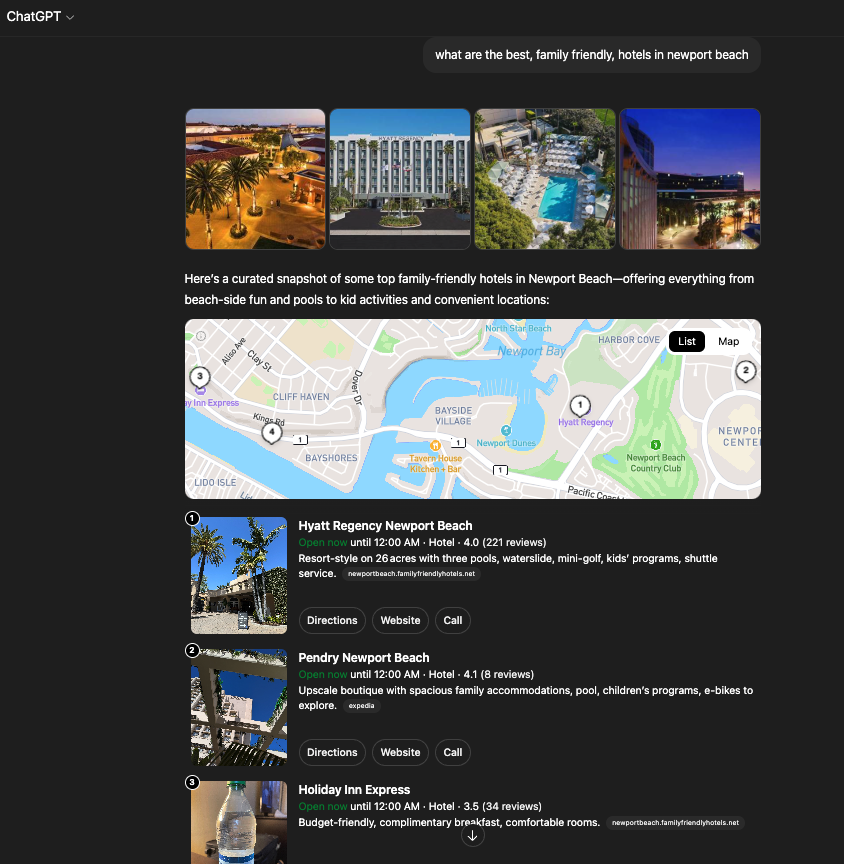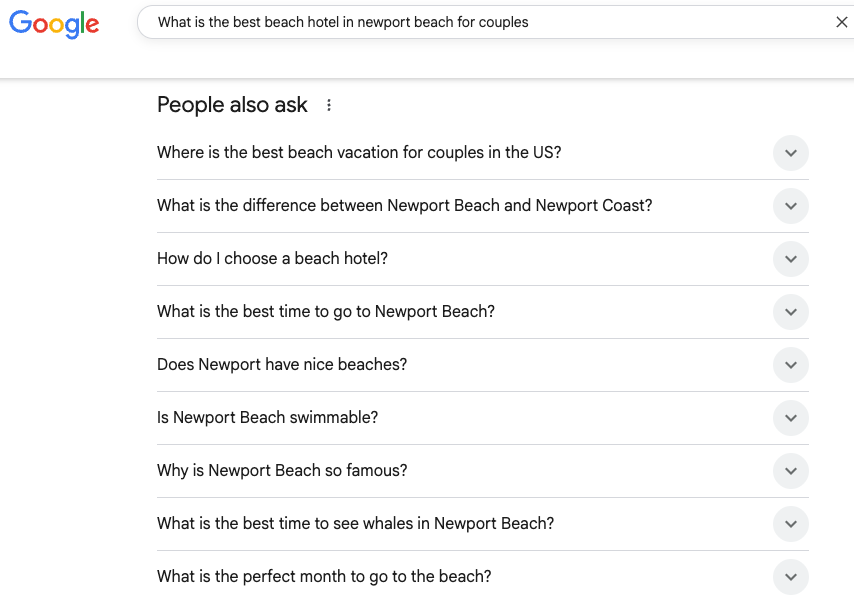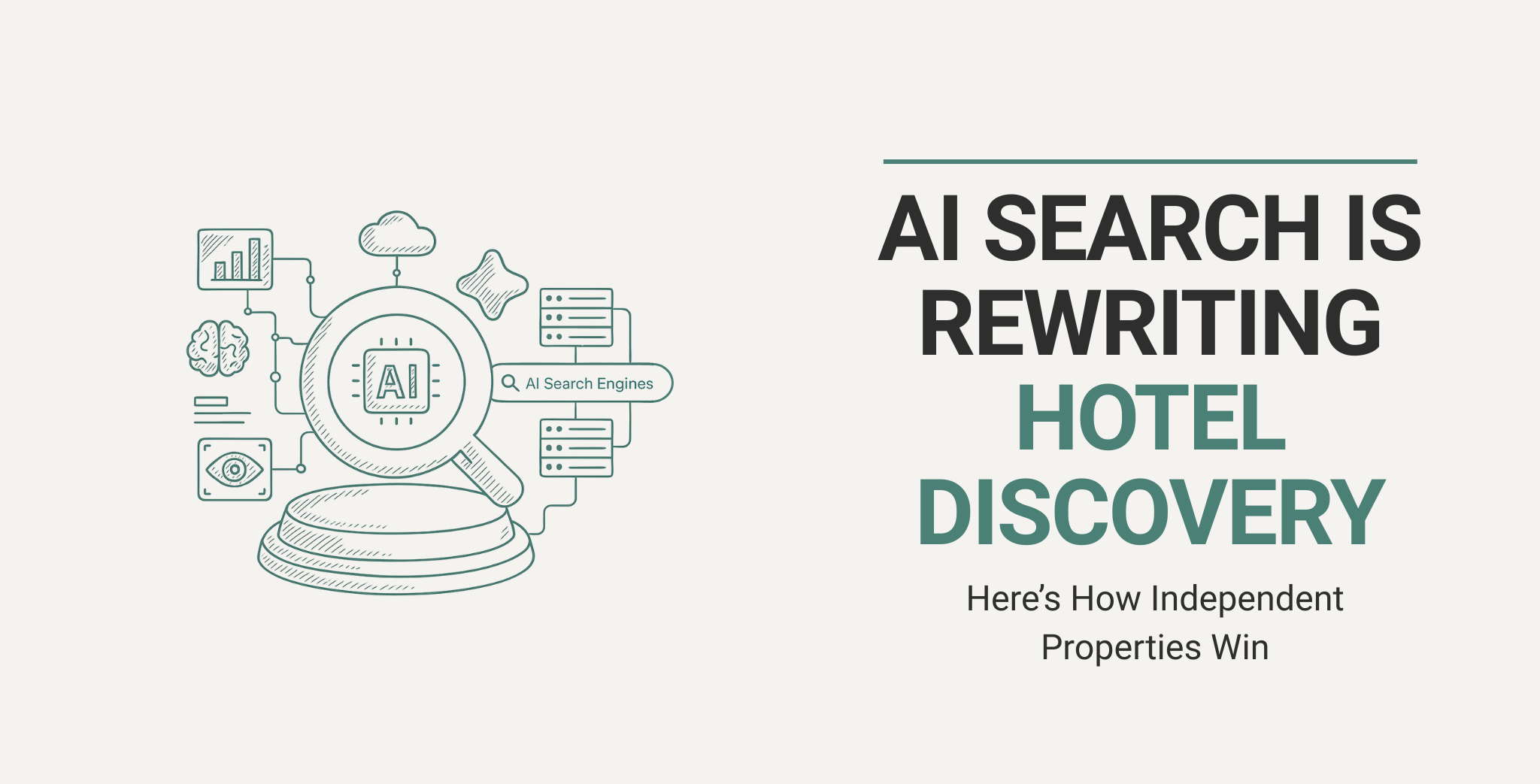Travelers’ search habits are transforming at lightning speed. Instead of scrolling through pages of search results, more people now turn to AI-driven tools like ChatGPT, Perplexity, Google Gemini, or Google’s AI Mode to plan their trips. Instead of searching for keywords, they pose natural-language questions like “Where’s the best boutique hotel in Napa Valley for a romantic honeymoon weekend?” and the AI often responds with a single, concise answer or recommendation. AI typically returns 1-3 properties… not a page of links. If you’re not listed, you’re probably not considered.
Hospitality experts have observed a dramatic shift:
- Travelers no longer scroll through search results; they rely on AI-generated answers and recommendations.
- AI search platforms synthesize data from countless web sources to provide a single, helpful response.
- Your next guest may find or fail to find you based on whether AI includes you in its answer.
This evolution is not hypothetical; it’s already reshaping how hotels get discovered. Google is now embedding AI directly into the search experience, summarizing travel suggestions in real time. In short, AI search is quickly becoming the new front door for boutique hotel visibility. Are you ready?
Context, Not Keywords: How LLMs Are Changing Search
If you’re unfamiliar with the term LLM (large language model), in short, it’s an AI system that reads and summarizes content on the web.
Unlike traditional search engines that prioritize keywords, LLMs like ChatGPT and Google Gemini evaluate the meaning and intent behind content.
They rely on:
- Contextual understanding over exact-match keywords
- Structured data (schema) to interpret what your website is really about
- Authority and completeness in how a topic is covered
LLMs assess:
- Whether your content provides complete, useful answers
- If your site demonstrates Experience, Expertise, Authority, and Trustworthiness (E-E-A-T)
- If other reputable sources online support what your content says
That means your hotel can no longer depend on outdated SEO tactics or sparse web pages. AI looks for rich, trustworthy narratives that answer specific traveler questions. If your site lacks this content, or worse, hides it behind poor structure, it likely won’t be surfaced in AI driven search.
Let me give you an example…
The old way that web pages might be optimized is by adding the keyword “hotel napa valley romantic” stuffed in your copy. The new way is building a page that is titled ‘A 48-Hour Romantic Itinerary in Napa from [Hotel]’ with specific, experience-level details (rooms, views, late check-out, nearby wineries, dinner reservations), marked up with schema. See the difference? It’s pretty dramatic.
Why Boutique Hotels Can’t Afford to Wait
Independent hotels face a growing risk of invisibility in the AI landscape. A recent Cloudbeds study found:
- Over 70% of hotels recommended by AI were part of a brand or large group (see the example below – Hyatt & Holiday Inn)
- More than half of the citations used by AI came from OTAs and third-party review sites.

What this means for you:
- If your hotel isn’t publishing authoritative content, AI may ignore you.
- If AI pulls from OTAs, your hotel’s description may come from third parties, with ZERO control over positioning or best-fit guests.
- Large hotel chains are deploying large budgets to train these models daily with structured, consistent content. Independent and boutique hotels that wait will get boxed out.
But there’s good news: AI doesn’t inherently favor large brands. It favors structure, clarity, authority, relevance, and presence. Early adopters have the opportunity to shape how AI systems perceive their property and gain a lasting competitive edge.
LLM Optimization in Practice: What It Takes to Show Up
Optimizing for AI search (or “LLM optimization”) means giving AI systems everything they need to understand and trust your hotel.
That includes:
1. Content Strategy for the AI Era
You need content that’s:
- Conversational and easy to digest
- Focused on answering real traveler questions
- Deep and specific (not generic descriptions)
- Rich in helpful details and unique insights
For example:
- Create FAQ pages addressing common booking or amenity questions
- Publish blog posts about your neighborhood or experiences that guests can enjoy
- Develop pages that showcase what makes your hotel unique, like your story, design, food, service, and location

LLMs reward completeness. The more relevant questions your site answers well, the more likely you are to be cited.
2. Structured Data (Schema) and Accurate Listings
AI engines consume data like schema markup to learn who you are and what you offer. In short, hotel schema equals richer answers (like star ratings) in AI and in Google, as well as easier inclusion in Google Travel.

You should:
- Use hotel-specific schema to tag amenities, room types, reviews, and FAQs
- Ensure your listings on Google Business, Bing Maps, and OTAs are consistent and detailed
- Connect your booking engine to Google Travel or similar platforms when possible
The clearer and consistent your structured data is, the easier it is for AI to surface your property in relevant answers.
3. Technical SEO & Crawlability
Technical readiness is crucial:
- Make sure your site is fast and mobile-friendly
- Avoid hiding content behind JavaScript or lazy-loading elements
- Ensure all key content renders in the initial HTML. If you’re on a heavy JS theme, add HTML summaries for rooms, amenities, reviews, and FAQs.
- Include HTML-based summaries, highlight boxes, and bullet lists for scannability
AI platforms can’t “see” what users see unless your content is cleanly rendered in the code.
4. External Authority & Digital Footprint
LLMs don’t just read your site; they triangulate your presence across the internet.
That means:
- Encouraging reviews on trusted platforms like Google and TripAdvisor
- Securing mentions in travel blogs, local news, or influencer content
- Maintaining active social media and directory listings
In the same study mentioned above, most hotels recommended by AI were found across multiple digital channels, including YouTube, Reddit, and travel forums. This matters. AI weighs how visible and well-regarded your property is, not just what’s on your website.
LLM Optimization Helps Your Traditional SEO Too
The best part? AI search optimization strengthens your traditional SEO performance as well:
- Better content helps you rank higher on Google
- Schema and structured data improve rich snippets and search results
- Page speed and site structure help both bots and humans navigate your site
Put simply, these are not two separate strategies. AI search and Google SEO are converging. Optimizing for one almost always supports the other.
Why You Shouldn’t DIY This
Trying to adapt your digital presence for AI on your own can lead to frustration and wasted time. The biggest challenge isn’t effort, but precision. You need to know which 10 pages to optimize, which FAQs to feature, which schema types to include, and which external citations/links will most influence AI answers for your destination.
Most internal hotel teams:
- Don’t have the tools to audit how their site performs in AI Search
- Aren’t aware of how their hotel is currently being presented by AI
- Miss out on technical and external signals that impact visibility
A comprehensive AI + SEO audit should include:
- Content gap analysis
- Schema and technical SEO review
- AI visibility testing across platforms (ChatGPT, Bing, Google Gemini, Etc.)
- Reputation and citation analysis
With these insights, you’ll know exactly what’s missing and what to prioritize.
AI discovery is not a hypothetical future; it’s today’s reality. If a potential guest asks ChatGPT, “What’s the best boutique hotel in my destination?” the model may respond with one or two hotels.
The question is: will one of them be yours?
Boutique hotels that act now can:
- Gain early visibility while competition is still low
- Influence how AI models describe and recommend their property
- Strengthen both AI and traditional SEO performance
If you’re unsure where to begin, reach out to request a free AI Search Optimization Analysis and strategy build. Let’s ensure your boutique hotel is positioned to thrive in this new era of search and not be left behind.
Greg is the founder and CEO of Stryde and a seasoned digital marketer who has worked with thousands of businesses, large and small, to generate more revenue via online marketing strategy and execution. Greg has written hundreds of blog posts as well as spoken at many events about online marketing strategy. You can follow Greg on Twitter and connect with him on LinkedIn.

